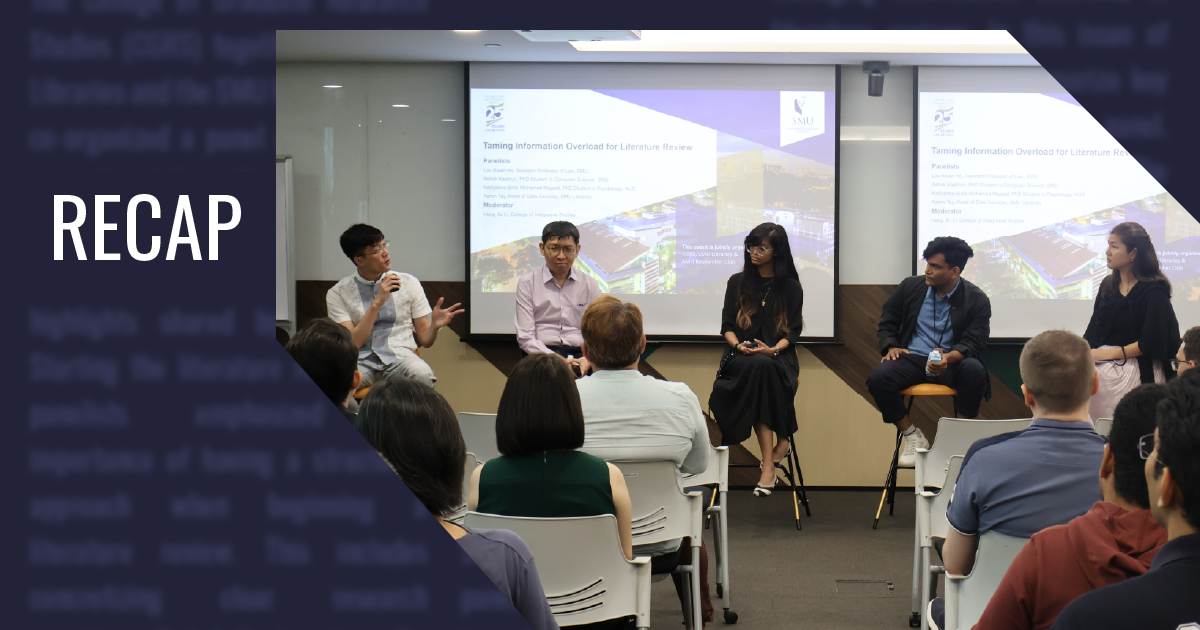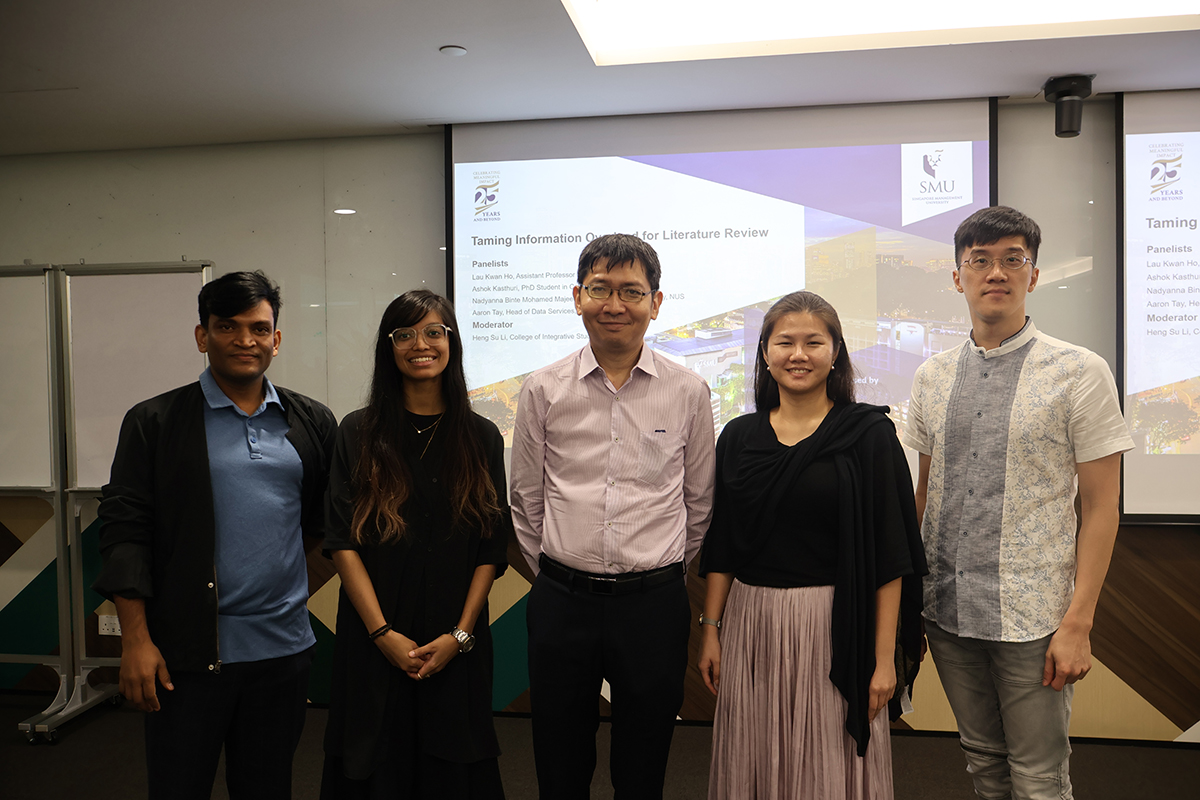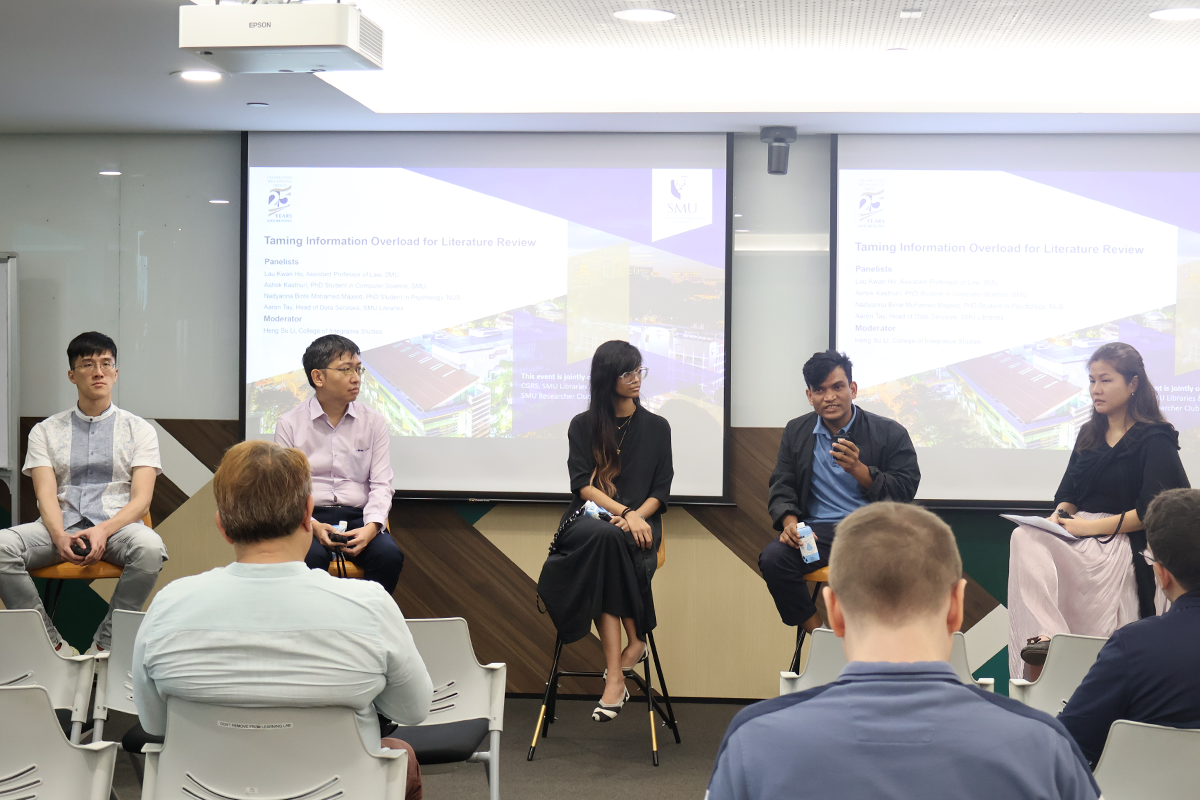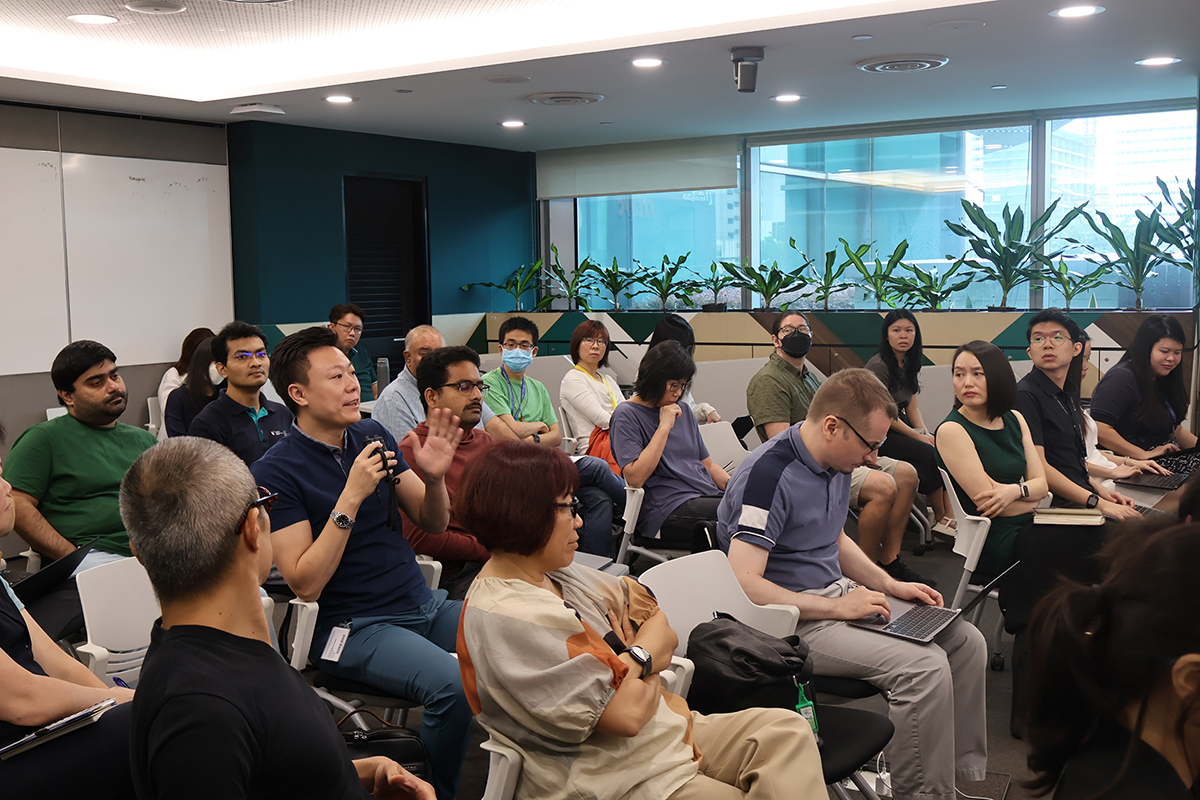
By Redzuan Abdullah, Senior Librarian, Research & Data Services, Tee Lip Hwe, Senior Librarian, Research & Data Services & Veronica Wang, Senior Librarian, Research & Data Services
Event: Taming Information Overload for Literature Review: Panel Discussion
Date: 15th January 2025
Venue: Lab 1, Li Ka Shing Library
Panel:
- Lau Kwan Ho, Assistant Professor of Law, Singapore Management University (SMU), Yong Pung How School of Law (YPHSOL), Panellist
- Ashok Kasthuri, PhD Student in Computer Science, Singapore Management University (SMU), Panellist
- Nadyanna Binte Mohamed Majeed, PhD Student in Psychology, National University Singapore (NUS), Panellist
- Aaron Tay, Head of Data Services, Singapore Management University Libraries (SMU Libraries), Panellist
- Heng Su Li, Research Associate, Singapore Management University (SMU), College of Graduate Research Studies (CGRS), Moderator
The College of Graduate Research Studies (CGRS), together with SMU Libraries and the SMU Research Club, co-organised a panel discussion on managing information overload in literature reviews. In this issue of Research Radar, we summarise key highlights shared by our panel.
Starting the literature reviews
The panellists emphasised the importance of having a structured approach when beginning a literature review. This includes concretising clear research questions that help to steer the search process. Besides the standard Google Scholar, researchers should consider using specialised databases depending on their research needs and leverage diverse resources like preprints to ensure comprehensive and evidence-based findings. The discussion highlighted how different disciplines demand varying levels of requirements - from selective focus on high-impact journals to extensive searches across multiple databases. The following are further pointers:
- Start with existing review papers for established fields
- For newer fields, one can focus on keyword searches, expert consultations or peer evaluations
- Use natural language for quick searches via AI tools such as Undermind for specific directions
- Approach with caution when using AI tools to search for papers. For example, terminology in psychology can have multiple meanings and may be picked up wrongly by AI
- For law literature reviews, textbooks and cases are frequently updated, this is always a good start, along with specialized legal databases
- Keywords should be properly scoped
- Document the research process by keeping a detailed record of your literature review process, including search strategies, databases used, and key decisions made, to maintain transparency and facilitate reproducibility
Critical evaluation of sources
Thorough reading is still the best bet. While AI can be valuable during exploratory stages, critical evaluation requires careful human analysis to further nuance one's understanding. The discussion highlighted how evaluation criteria vary by discipline - from hierarchical journal rankings in law to specific methodological considerations in psychology. Noteworthy, too, was the emphasis on maintaining accuracy when using AI tools, with panellists cautioning against over-reliance on AI-generated interpretations and avoiding errors from misrepresented AI tools. The following are further pointers:
- Always critically assess literature, even from reputable journals, and avoid superficial citations to contribute meaningful insights
- Using AI for explorative search is fine, but there is no escaping from reading the papers
- Instead of recognising pieces that are relevant to the research, one should also develop the skills to draw insights and communicate them without AI
- When synthesising the knowledge, it's important to avoid conformation bias by not neglecting opposing viewpoints
- For law, researchers work within a well-established hierarchy of journals and publications and the decision to include a particular work demands a thorough evaluation of its relevance, authority and jurisdictional applicability
Organisation methods and tools
Various organisational approaches were discussed, from simple folder structures to using bibliographic tools to manage research findings. While some panels prefer digital file organization methods with detailed naming conventions, others utilise tools like Zotero for collaborative research within a team. No single system works for everyone - the key is finding an approach that aligns with individual research styles and needs. This could be colour-coding to aid in your process when synthesising knowledge, marking different types of information within papers, clarifying reasons for inclusion and exclusion of articles selected and identifying new concepts or looking for potential gaps in the literature.
All in all, it is good to maintain a well-structured and consistent research system and potentially leverage AI for exploratory phases, while ensuring manual oversight and regular updates to stay aligned with research needs. Effective research management tools, whether digital or physical, should align with individual workflows and preferences to enhance knowledge acquisition and retrieval.
Of time management, boundaries, and other good practices
The discussion addressed practical aspects of managing reading time and setting boundaries in literature review work. While daily reading habits were encouraged, the panel emphasised quality over quantity. The time investment varies significantly based on the project stage and researcher's familiarity with the topic. The panel also gave some suggestions to new researchers:
- Set reading alerts and carve out protected and regular time slots for reading, even if just an hour daily
- Maintain intentionality in search strategies and avoid getting sidetracked by interesting materials -- save and read them later
- Use notification systems to stay updated on new publications and topics in their field
- Consult with supervisors to establish reasonable scope boundaries for literature reviews
- Firm-up your research questions and these guide search strategies and literature selection
- More importantly, address feedback constructively on your research, even if it seems off-track, as it may be unclear to more than one person, to refine your research and improve clarity
- Build your research tribe and stay connected of developments in your field
- Evaluate different research experiments, methods and samples used in field
- Attend conferences and academic presentations with clear purpose in mind, set the framework to achieve it, document and review the feedback received
- Reading and writing in research are iterative, and ongoing flexible tasks that require balancing focus with strategic breaks and targeted approaches.
- Maintain a sustainable routine and pace that fosters both productivity and mental well-being
The overall messages emphasised having the right balance -- of systematic approach, critical thinking, motivation, and practical time management, all while maintaining flexibility to adapt these practices to individual preferences and disciplinary requirements.


